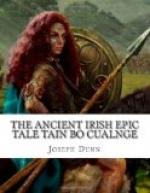[1-1] LU. fo. 71b, in the margin.
[a] Here a sheet is missing in Eg. 1782.
[2-2] LU. 1415-1486.
“Pray Cuchulain,” said Medb and Ailill, “that he suffer us to change our place.” This then was granted to them and the change was made.
The ‘Pains’ of the Ulstermen left them then. When now they awoke from their ‘Pains,’ bands of them came continually upon the host to restrain it again.
* * * * *
[Page 143]
XIIe
[1]THE SLAUGHTER OF THE BOY-TROOP[1][a]
Now the youths of Ulster discussed the matter among themselves in Emain Macha. “Alas for us,” said they, “that our friend Cuchulain has no one to succour him!” “I would ask then,” spake Fiachu Fulech (’the Bloody’) son of Ferfebe and own brother to Fiachu[b] Fialdana (’the Generous-daring’) son of Ferfebe, “shall I have a company from you to go to him with help?”
[1-1] LU. fo. 71b, in the margin.
[a] The LU. version of the episode is given under XVIIa, page 184.
[b] Fiachna, in LU. 1436.
Thrice fifty youths accompany him with their play-clubs, and that was a third of the boy-troop of Ulster. The army saw them drawing near them over the plain. “A great army approaches us over the plain,” spake Ailill Fergus goes to espy them. “Some of the youths of Ulster are they,” said he, “and it is to succour Cuchulain they come.” “Let a troop go to meet them,” said Ailill, “unknown to Cuchulain; for if they unite with him ye will never overcome them.” Thrice fifty warriors went out to meet them. They fell at one another’s hands, so that not one of them got off alive of the number of the youths of Lia Toll. Hence is Lia (’the Stone’) of Fiachu son of Ferfebe, for it is there that he fell.
“Take counsel,” quoth Ailill; “inquire of Cuchulain about letting you go from hence, for ye will not go past him by force, now that his flame of valour has risen.” For it was usual with him, when his hero’s flame arose in him, that his feet would turn back on him and his buttocks, before him, and the knobs of his calves would come on his shins, and one eye would be in his head and the other one out of his head. A man’s head would have gone into his mouth. There was not a hair on him that was not as sharp as the thorn of the haw, and a drop of blood was on each single hair. He would recognize neither comrades nor friends. Alike he would strike them before and behind. Therefrom it was that the men of Connacht gave Cuchulain the name Riastartha (’the Contorted One’).




